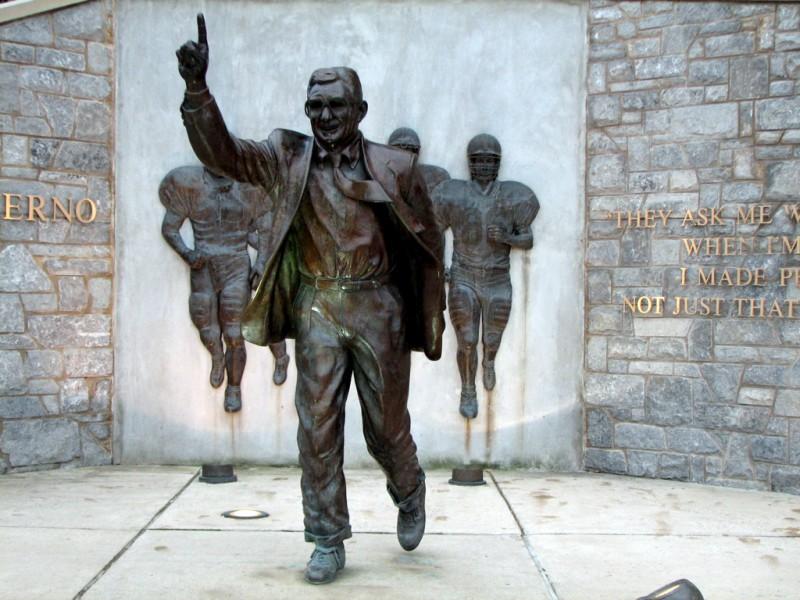Nading: Athletic idolatry pernicious to public character
Photo courtesy of Flickr/audreyjm529
Opinion: Joe Paterno
July 26, 2012
I love football.
That may be a rare saying coming from a girl, but I really have a passion for the sport. I don’t claim to be any expert on the strategy, rules or insider knowledge about drafts and the athletes, but I know how to be a diehard fan. Whether it’s the ISU Cyclones or the Minnesota Vikings, you can bet that I’ll watch every game of the season and be cheering, or cursing, throughout it all, win or lose.
So when it comes to idolizing sports teams, I get how it can overcome someone’s entire mindset. However, this country has gone a little crazy the past few decades when it comes to putting players and the coaching staff of collegiate and professional sports up on a pedestal of admiration.
Suddenly, if you can win enough football games to break a record, you somehow become superhuman. You’re no longer accountable for the mistakes “normal” humans make. For example, when Reggie Bush used bribes as a recruiting tactic for the University of Southern California, or when Tiger Woods decided to sleep with one too many women behind his wife’s back. Regardless of the force field they assumed their fame placed around them, they were caught and reprimanded for their actions.
Newsflash: those successful athletes and coaches are, in fact, just as human as the rest of us.
The Joe Paterno/Jerry Sandusky/Penn State scandal has been overworked, overthought, and overpublicized this last year, but I am going to beat the dead horse here, because that Joe Paterno statue that was removed from Penn State was rightfully done. They should also burn it and bury it into the ground while they’re at it.
Paterno was an unbelievably successful coach. Holding more bowl victories than any college in history, two national championships and five undefeated seasons, there’s no doubting he was great at what he did. But no amount of collegiate football wins can erase the abuse that was put upon those young boys by Jerry Sandusky for over 10 years — abuse Joe Paterno could have put a stop to immediately.
Mandated reporters are professionals who, in the ordinary course of their work and because they have regular contact with children, are required to report whenever physical, sexual or other types of abuse have been observed or suspected. Each state has its own more specific rule for mandated reporters.
The Pennsylvania general rule for mandated reporting states (relating to persons required to report suspected child abuse): “If in the course of employment, licensees shall report or cause a report to be made to the Department of Public Welfare when they have reasonable cause to suspect that a child coming before them in their professional or official capacity is a victim of child abuse.“
Simply put, if you are aware or have any small hunch your longtime assistant coach — founder of a charity program your football program sponsored for underprivileged boys — was sexually abusing, molesting and fondling those boys, you are sure as hell supposed to say something. Now even though Paterno took his knowledge of the abuse to Penn State’s athletic director and vice president of Finance and Business, he never followed up on something being done about the situation. One would think that if it wasn’t the law that forced you into reporting abuse, your conscience would take over somewhere along the lines.
But clearly, that wasn’t the case for Paterno.
Paterno is the poster child for the problem of successful sports icons thinking they’re somehow above the law. That statue that once stood outside of Penn State’s stadium is now tainted by Paterno’s actions, or better yet, his lack of action. This lack of judgment shouldn’t be put on display for all to see. It deserves to be taken down and should never be erected again.
Being great at a sport, or being great at coaching a team is never greater than a person’s well-being. What Joe Paterno did — not following up on the reports of abuse, never confronting Sandusky himself, never saying more about the abuse for 10 years, all to save his reputation as one of the greatest college football coaches in history — completely destroyed the lives of those affected by Jerry Sandusky.
The definition of a hero is a man of distinguished courage or ability, admired for his brave deeds and noble qualities. Those kinds of people, noble and courageous, deserve to have statues erected in their honor. Those who cower at the thought of their reputation being ruined — and are selfish enough to sacrifice the well-being of others for their own success — don’t ever deserve to have any monuments erected in their name.

















